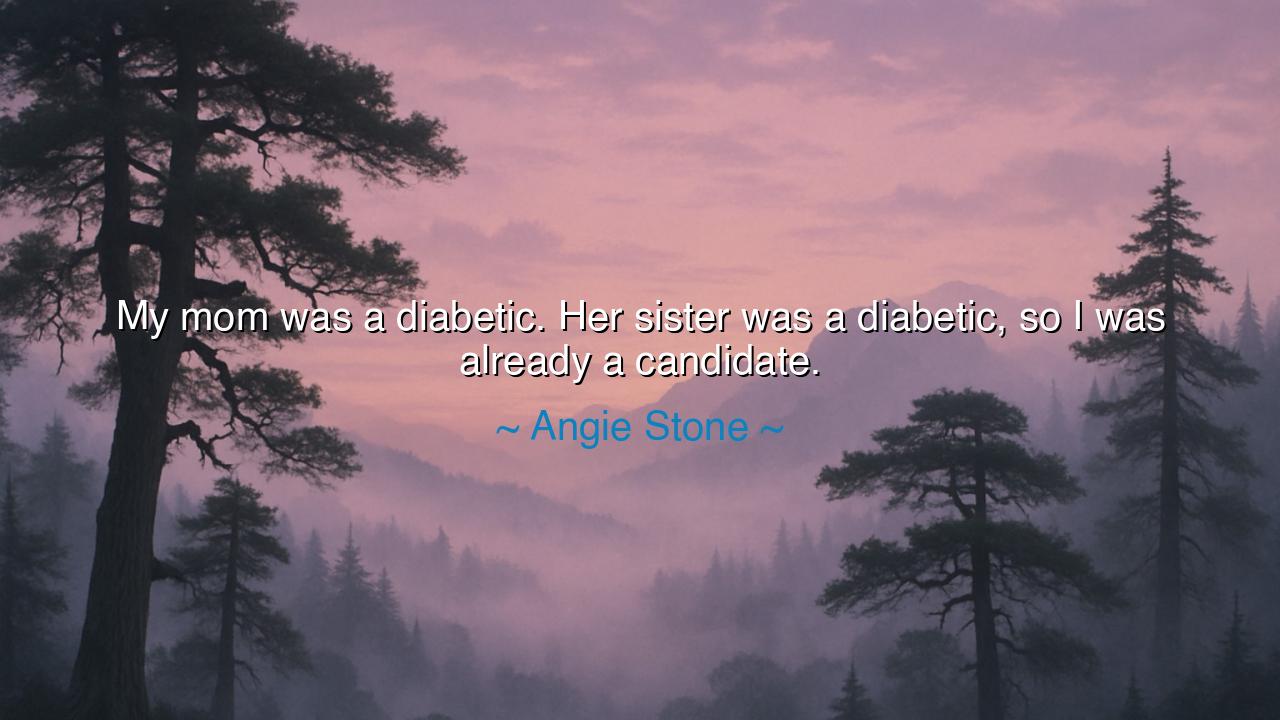
My mom was a diabetic. Her sister was a diabetic, so I was






There are truths we inherit not through choice, but through lineage and circumstance. Angie Stone reflects on one such inheritance when she says, “My mom was a diabetic. Her sister was a diabetic, so I was already a candidate.” In these words, she acknowledges the profound reality that our bodies carry the echoes of those who came before us, that health and vulnerability can pass as surely as memory and character. It is a recognition of the interconnectedness of generations, and a call to mindfulness regarding the legacies we inherit.
To be “already a candidate” is to confront a truth both biological and existential. In the ancient understanding of life, the condition of the body was seen as intertwined with destiny. The humors of Hippocratic medicine, the Daoist understanding of qi, the Ayurvedic principle of prakriti—all recognized that predispositions shape the human experience, even as environment and choice exert influence. Stone’s reflection is the modern acknowledgment of this ancient insight: heredity defines probability, but awareness empowers action.
The sadness she implies is not only in personal risk but in witnessing the suffering of loved ones. Seeing a parent endure diabetes instills a dual awareness: empathy for their pain and anxiety for one’s own future. The lineage of illness, as Stone notes, is both literal and symbolic. It is a reminder that we walk paths partially paved by our ancestors’ bodies, habits, and conditions. The ancient philosophers understood that knowledge of such inheritance allows one to live more deliberately, to honor both the past and the body we are entrusted with.
Consider the story of Benjamin Franklin, who suffered from gout and other hereditary conditions. He observed carefully his diet, habits, and daily regimen, understanding that while heredity might shape susceptibility, conscious choices could alter outcomes. Stone, similarly, recognizes that being a “candidate” for diabetes is not surrender; it is a call to vigilance, self-care, and wisdom. Her awareness is the first step in navigating inherited vulnerability with courage and responsibility.
There is also a profound lesson in acceptance coupled with agency. To acknowledge genetic predisposition is not to yield to fear, but to embrace foresight. Ancient traditions often taught that awareness of limitations is the foundation of strength. In Sparta, young warriors trained to understand their physical boundaries; in Taoist thought, humans were instructed to know their constitution and balance it with disciplined practice. Stone’s words echo this principle: knowledge of risk can guide behavior and preserve life, even when fate has sown challenges before birth.
Moreover, Stone’s reflection underscores the moral dimension of health. In recognizing the lineage of diabetes, she is also reminded of the responsibility to nurture her own well-being, to honor the sacrifices and struggles of those who came before. This resonates with the ethos of the ancients, who believed that one’s body is a sacred vessel, entrusted to each person to maintain, strengthen, and respect. In this sense, hereditary awareness is not a burden alone, but a call to stewardship and intentional living.
From Stone’s observation, we derive a timeless lesson: acknowledge the inheritance of your body, mind, and spirit, and act with wisdom to shape your own path. Predispositions may exist, yet they are not absolute. Awareness, prevention, and deliberate choices allow one to mitigate risk and honor the legacy of forebears. Just as she recognizes the probability of diabetes, so too must we recognize the influence of our heritage on every aspect of life, from health to character.
Thus, let Angie Stone’s words guide reflection and action: see clearly what has been passed down to you, respect the challenges encoded in your lineage, and respond with vigilance, care, and discipline. By doing so, we transform inheritance from inevitability into opportunity—an opportunity to cultivate resilience, to honor our ancestors, and to forge a life that is both mindful and empowered, even in the shadow of risk.






AAdministratorAdministrator
Welcome, honored guests. Please leave a comment, we will respond soon